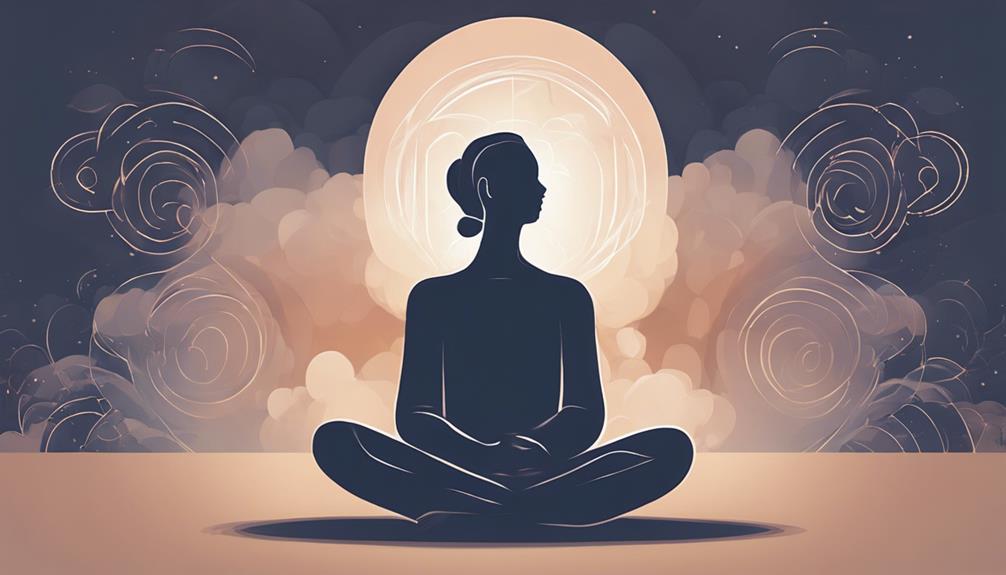Self-hypnosis empowers personal growth by tapping into the subconscious. Set specific, measurable goals for success with clear direction. Create a consistent, calming routine to enhance effectiveness and focus. Use visualization techniques to deepen relaxation and reinforce positivity. Monitor progress and adjust techniques for optimal outcomes. Unlock your potential and improve well-being through self-hypnosis.
Benefits of Self-Hypnosis for Lifestyle Enhancement

Self-hypnosis has been increasingly recognized for its potential to enhance lifestyle through empowering individuals to tap into their subconscious mind for positive change. Two key benefits of self-hypnosis are improved focus and stress reduction.
By engaging in self-hypnosis practices, individuals can enhance their ability to concentrate on tasks at hand, ultimately leading to increased productivity and efficiency in daily activities. Improved focus can also aid in achieving personal and professional goals by allowing individuals to maintain their attention on important tasks without being easily distracted.
Furthermore, self-hypnosis has shown promising results in stress reduction. Through techniques such as deep breathing, visualization, and positive affirmations, individuals can effectively manage and alleviate stress levels. By accessing the subconscious mind during self-hypnosis sessions, individuals can reframe negative thought patterns, promote relaxation, and cultivate a sense of inner calm.
This can lead to improved overall well-being and a better quality of life. Ultimately, the combination of improved focus and stress reduction through self-hypnosis can contribute to a more balanced and fulfilling lifestyle.
Setting Clear Goals for Hypnosis Success
Establishing specific and measurable goals is a crucial step towards achieving success in the practice of hypnosis. Goal setting is a fundamental aspect of self-improvement through hypnosis as it provides a clear direction for the subconscious mind to work towards.
When setting goals for hypnosis success, it is essential to be specific about what you aim to achieve, whether it's overcoming a specific fear, improving confidence, or enhancing overall well-being. Measurable goals allow you to track your progress and adjust your hypnosis sessions as needed to stay on course.
To effectively set goals for hypnosis success, start by identifying areas in your life that you wish to improve or change. Once you have determined the areas of focus, create specific and achievable goals that are relevant to your desired outcomes. It is also beneficial to set a timeframe for when you aim to achieve these goals, providing a sense of urgency and motivation for the subconscious mind to work towards them.
Establishing a Relaxing Hypnosis Routine

Developing a consistent and calming hypnosis routine can significantly enhance the effectiveness of your practice. By establishing a regular schedule for your self-hypnosis sessions, you create a structured environment that promotes relaxation and focus. This routine can help strengthen the mind-body connection, allowing you to tap into the subconscious more easily and effectively.
The repetitive nature of a routine also signals to your brain that it is time to unwind and let go of stress, making it easier to achieve a state of deep relaxation during your sessions.
Furthermore, a relaxing hypnosis routine can be instrumental in stress reduction. By dedicating time each day to engage in self-hypnosis, you provide yourself with a valuable opportunity to unwind, release tension, and reset your mind. This practice can help alleviate the physical and mental effects of stress, promoting overall well-being and enhancing your daily life.
Consistency is key when it comes to reaping the benefits of self-hypnosis for stress reduction and overall wellness.
Using Visualization Techniques for Better Results
Incorporating visualization techniques can enhance the efficacy of your self-hypnosis practice by engaging the power of mental imagery to deepen relaxation and reinforce positive suggestions. Visualization benefits play a crucial role in self-hypnosis as they allow individuals to create vivid mental images of their desired outcomes, facilitating a stronger mind-body connection.
By visualizing specific scenarios or goals during a self-hypnosis session, individuals can tap into the subconscious mind's ability to influence the body's responses and behaviors. Research indicates that visualization benefits extend beyond just mental rehearsal; they can lead to improved confidence, reduced stress levels, and enhanced overall well-being.
The mind-body connection established through visualization techniques can promote a sense of empowerment and aid in achieving desired outcomes more effectively. When combined with self-hypnosis, visualization techniques serve as a powerful tool to reprogram negative thought patterns, instill positivity, and cultivate a deeper sense of relaxation and focus.
Monitoring Progress and Adjusting Techniques

Assessing the effectiveness of your self-hypnosis practice and making necessary adjustments is essential for optimizing its outcomes and achieving your desired goals. Progress evaluation plays a crucial role in this process. Regularly monitoring your progress allows you to track the impact of your self-hypnosis sessions on your goals. By objectively assessing whether you are moving closer to your desired outcomes, you can determine the effectiveness of the techniques you are using.
In addition to progress evaluation, technique tweaks are another vital aspect of monitoring and adjusting your self-hypnosis practice. Self-reflection is key here, as it enables you to identify which techniques are yielding the best results and which may need modification. Adjustment strategies may include experimenting with different induction methods, varying the content of your suggestions, or altering the duration of your sessions.
Frequently Asked Questions
Can Self-Hypnosis Be Used for Physical Pain Management?
Self-hypnosis can be a valuable tool for physical pain management by targeting the mind-body connection. Research suggests it can help alleviate discomfort through techniques aimed at inducing relaxation, emotional healing, and stress relief.
Is Self-Hypnosis Effective for Improving Self-Confidence?
Self-hypnosis has shown efficacy in improving self-confidence for various applications. Research indicates its benefits in public speaking anxiety reduction and enhancing athletic performance by increasing focus and mental resilience. Its potential for confidence enhancement is promising.
How Often Should I Practice Self-Hypnosis for Best Results?
To achieve optimal benefits, practice self-hypnosis consistently. Start with sessions 2-3 times a week, gradually increasing frequency based on progress. Regular practice enhances the effectiveness of techniques and facilitates long-term improvements in self-confidence and other desired outcomes.
Can Self-Hypnosis Help With Overcoming Phobias or Fears?
Self-hypnosis can be effective in aiding anxiety relief and overcoming phobias, including fear of public speaking. Research suggests that self-hypnosis techniques can help individuals manage and reduce these anxieties by promoting relaxation and fostering positive mindset shifts.
Is Self-Hypnosis Safe for Everyone, Including Children?
When considering child safety in relation to self-hypnosis, it is crucial to emphasize the necessity of parental guidance. While self-hypnosis can be safe for many individuals, children should always have adult supervision and support when engaging in such practices.
Conclusion
In conclusion, self-hypnosis can significantly enhance one's lifestyle by helping individuals set clear goals, establish a relaxing routine, use visualization techniques, and monitor progress.
By incorporating these tips into their daily practice, individuals can experience improved mental, emotional, and physical well-being.
Self-hypnosis offers a powerful tool for personal growth and self-improvement, making it a valuable resource for those looking to enhance their overall quality of life.
